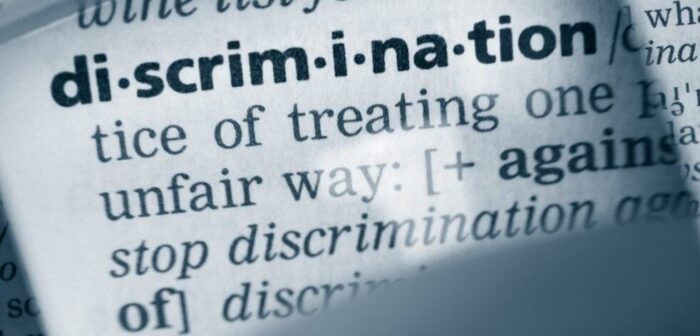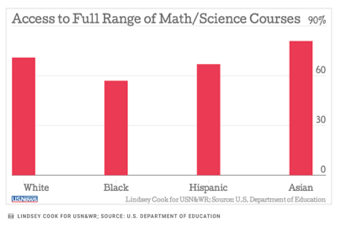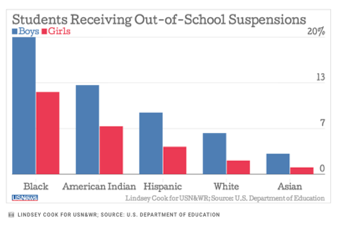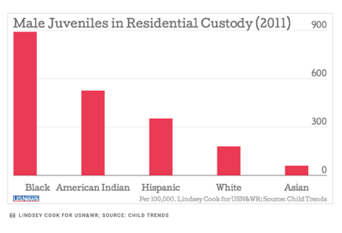YOUTH GROUP LESSON ON RACISM – DISCRIMINATION (4 OF 4)

Written by Natasha Menifee
This is the last of four lessons that we’re releasing on the topic of racism.
The big idea of this lesson is:
What we believe and how we practice those beliefs should be a reflection of our love for God and His people.
I hope you find this lesson helpful.
– Ministry to Youth Team
Note: As mentioned above, this is the last of 4 lessons on racism. Check out the other three lessons here:
Looking for youth ministry curriculum? Check out the…
4TH OF JULY BUNDLE – Save 75% on 8 youth ministry series, 2 junior high series and 15 back to school games. Only available through Thursday, July 10!

YOUTH GROUP LESSON ON RACISM – DISCRIMINATION (4 OF 4)
DOWNLOAD THE PDF OF THIS LESSON
Bible: Proverbs 6:16-19; James 2:23-24; Galatians 3:27-29
Bottom Line: What we believe and how we practice those beliefs should be a reflection of our love for God and His people.
“In God we trust, all others must bring data.” – W. Edwards Deming
W. Edwards Deming was a champion of using data and measurement to understand and quantify current performance against the standard correctly. Understanding a problem through robust data collection and analysis provides a solid foundation to begin problem-solving. (Taken from https://www.industryforum.co.uk/)
As we read this statement, notice these words: data – understand – current performance – against standard.
Today, let’s think about what would happen if our society looked at the statistics about discrimination (data) to better understand what is happening.
What would happen if we looked at the current performance (practices in housing, education, criminal justice, finance, etc.) against the standard (the Word of God)?
Could we then understand the problem and begin to solve it?
Let’s take a look at some data.



Sadly, the data is clear. Our current performance is far below the standard.
But, despite the people and systems that seek to uphold unjust or prejudicial practices, God is still in control, and nothing takes Him by surprise.
This lesson will address discrimination, both individual and collective practices within a group, organization, or government. Practices that are contrary to the Word of God.
OPENING ACTIVITY: WHAT WOULD YOU DO?
This activity can be done online or in-person.
ACTIVITY PREP
Before students arrive, queue the following video links:
Wrestler:
Graduation:
Female Football Player:
Ask: Have you ever heard of the TV show, “What Would You Do?”
The show uses hidden cameras to observe and comment on how ordinary people behave when confronted with dilemmas that require them to either take action or walk by and mind their own business.
Various scenarios are created which focus on race, gender, family issues, etc.
Say: Today, we will have our own version of “What Would You Do?”
We will look at three scenarios and address the following questions:
- What act of discrimination is taking place?
- Why is what happened considered discrimination?
- What would you do if this was you or someone in your family?
Leaders can do this activity as a whole group exercise, or divide the group into smaller groups), assigning each team a video for discussion.
If using the small group discussion format, it is important to come back together and share in the large group.
TEACH
Say: We’ve seen different types of discrimination and other ways to define it systematically.
Now we will look at the topic more closely and use the Word of God as our filter.
Read James 2:23-24.
And the scripture was fulfilled that says, “Abraham believed God, and it was credited to him as righteousness,” and he was called God’s friend. You see that a person is considered righteous by what they do and not by faith alone.
What is James telling us in these verses?
He says that those who are saved through faith by God’s grace will participate in good works.
Good works do not save us, but real faith does produce a visible change in our lives.
Today’s world is full of people who want us to hear what they say and ignore what they do.
However, in the Book of James, we see a reminder that what we do is directly connected to what we believe.
Think about these questions…
Does faith create policies and procedures that intentionally keep people oppressed?
Does authentic faith only help one group of people while others are hindered?
Can inequality in our education, healthcare, and finances be considered righteous?
James reminds us that Abraham was credited as righteous because he believed in God.
Abraham did not do works to get his salvation.
As a result of his salvation, he desired to live in a way that pleased God.
As Christians, we cannot work to earn salvation.
However, because we have been saved through faith in Jesus, that should impact our actions.
Saving faith leads to authentic change.
As Christians, if we allow our faith to guide our works, the impact we can make will be game-changing!
Systems, policies, and practices that promote inequality would have no place in our society.
People say that they believe in a lot of things.
However, it’s what we do that shows what we truly believe.
Ask yourself… would anyone know I believed in Christ based on my treatment of others?
Do your actions show the love of Jesus?
1 John 2:15 tells us, “Do not love the world or the things in the world. If anyone loves the world, the love of the Father is not in him.”
When this verse references “the world,” it’s referring to humankind’s purposes, practices, and places where God is not wanted.
The systems of “the world,” especially systems like racism and discrimination, are not of God.
Many people claim to be religious, but their treatment of others reflects whether or not they are reflecting the love of the Father.
This is why it is important to know God’s Word for yourself.
God wants us to know what is right so we can recognize it.
We must admit what is true, and make truth the core of our lives.
When something is not true, we must admit it is not true.
Yes, even at your age, you can stand against dishonest practices.
Spiritually, morally, and ethically, you should aim not to live “on the fence.”
The love of God inside of you encourages you to be different in your school, your community, and in your own family.
Ask: Have you ever chosen to speak up because you knew the real truth in a situation?
What was the outcome?
Allow time for responses and discussion from the group.
Say: The Bible tells us in Ecclesiastes 1:9, there is nothing new under the sun.
Discrimination against certain people groups is no exception.
Unfortunately, the mistreatment of one group by another has been going on for centuries.
This type of behavior is not only harmful to others but also offensive to God.
Remember, man was made in the image of God.
When we engage in or support actions of injustice, we demonstrate that we do not value God’s creation.
Division, hatred, and oppression do not line up with the character of God.
As people of God, our thoughts, words, and actions should reflect Him.
We should be different from the world.
We should stand against the injustice in the world.
When we love like God loves then we stand against the things that God hates.
In Proverbs, we find a clear warning about the type of behavior that is contrary to who God is.
Read Proverbs 6:16-19.
There are six things the Lord hates, seven that are detestable to him: haughty eyes, a lying tongue, hands that shed innocent blood, a heart that devises wicked schemes, feet that are quick to rush into evil, a false witness who pours out lies and a person who stirs up conflict in the community.
Note to Leaders on God and Hate: It is important to make sure students have a clear understanding of God’s character as it relates to love and hate before digging into these passages of Scripture.
1 John 4:8 tells us, “…God is love.”
God does not hate anyone.
God is love and He loves all of us.
He loves us so much that He sent Jesus to die for our sins so we have the opportunity to be in relationship withHim again.
Read John 3:16.
For this is how God loved the world: He gave his one and only Son, so that everyone who believes in him will not perish but have eternal life.
The wonderful thing this Bible passage tells us is that even if you were the only person on earth, He still would have sent Jesus just for you.
However, we must remember God is also perfectly true, righteous, and holy.
Therefore, God must hate evil, because it is the opposite of everything He is.
The Bible does make several references to God’s hatred, not of individuals, but of sin and unrighteousness.
Say: The only perfect person to ever walk the Earth was Christ.
Perfection is not required to be a Christ-follower; however, love is.
When we begin loving others, seeing them as Christ does, we do not have room to look down on anyone.
Skin color, economic status, gender, etc. do not impact Christ’s love for us.
Mistreating any human being because of any of these reasons is not modeling the love Christ has for us.
God also requires honesty.
God is incapable of lying.
Lying hurts our relationship with God and with others. Lying diminishes trust between human beings.
When there is no trust, fear can set in, and fear can open the door to hatred.
Both fear and hate lay a foundation for discrimination.
Dishonest practices and lying have helped continue systemic discrimination and racism in our country.
Take a look at these examples. Have you or someone you know been impacted by one of these situations?
- Banks have lied about lending practices to keep black people out of certain neighborhoods.
- Employers have lied to female candidates about their qualifications to save the position for a man.
- Children lie to parents about the person they are dating because they are a different race or religion.
Give the group time to discuss the examples.
All of the examples above didn’t just happen. The ideas and plans came from somewhere.
A heart that is full of evil will produce thoughts that lead to actions of evil. Our hands, heart, and feet all work together for good or for bad.
Re-read Proverbs 6:16-19.
Solomon warns us in this passage about a heart that creates evil.
Because what is formed in the heart, is carried out by our hands and feet.
Many times, these actions are not of one individual.
It is when multiple people bring their individual evil together that collective actions follow.
Collective actions lead to systems and practices that are harmful to actions that stir up conflict.
This sin is against those in our community. Our fellow brothers and sisters.
This is when a person or group of people causes others to be at war.
This behavior is totally opposite to the will of God concerning His people.
1 Corinthians 1:10 says, “I appeal to you, brothers and sisters, in the name of our Lord Jesus Christ, that all of you agree with one another in what you say and that there be no divisions among you, but that you be perfectly united in mind and thought.”
Unfortunately, everyone does not see it that way, and people make their own rules.
Rules built on hate, fear, and deceit always benefit some at the expense of others.
Things like money and power, being the best, and looking out for yourself are the ways of the world.
It’s because of these things that people will lie, cheat, and steal.
Righteous living doesn’t make sense to the world. But it should make sense to followers of Christ.
Now, let’s look at these seven behaviors through the lens of discrimination.
Identify real-world examples for each thing that God hates.
Give the group time to think, discuss, and share.
| Detestable Things | Examples in the world |
| Haughty eyes | |
| Lying Tongue | |
| Hands that shed innocent blood | |
| A heart that devises wicked schemes | |
| Feet that rush into evil | |
| False witness | |
| Stirs up conflict in the community |
Read Galatians 3:27-29.
…for all of you who were baptized into Christ have clothed yourselves with Christ. There is neither Jew nor Gentile, neither slave nor free, nor is there male and female, for you are all one in Christ Jesus. If you belong to Christ, then you are Abraham’s seed, and heirs according to the promise.
Christ came to reconcile us back to God and unify us with each other. Division is not a characteristic of God.
Discrimination and discriminatory practices contradict God’s view of His people.
Paul reminds the Galatian church and us today that, if we are a part of Christ, we should model Christlike behavior.
The differences that the world promotes should not be what we encourage.
Paul touched on the key areas that many people are discriminated against in today’s society.
- Jew nor Gentile – religious and ethnicity discrimination.
- Slave nor free – racial and socioeconomic discrimination
- Male and female – gender discrimination
Although he did not list them all, any other type of discrimination is covered in this verse.
Verse 28 – Fill in the blank.
Take some time and fill in the blanks with some other terms based on the issues we face in our world today.
There is neither __________ nor __________, neither __________ nor __________ nor is there _____ and _________ for you are all one in Christ Jesus.
No matter who goes in the blank, the scripture is still true.
We are ALL one IN CHRIST.
We are to see others as Christ does and treat them like He would.
Close in prayer.
SMALL GROUP DISCUSSION QUESTIONS
- What role do you think the church (the body of Christ) has in the fight against discrimination?
- How do a person’s actions demonstrate what they believe?
- Think about your own actions and the actions of any groups you may belong to.
- What do your actions show about what you believe?
- What do the actions of your group show about the beliefs of your group?
- Do these actions reflect the values of Christ?
- What does Paul mean in Galatians 3:28 when he says, “There is neither Jew nor Gentile, neither slave nor free, nor is there male and female, for you are all one in Christ Jesus.?”
- What does the statement “you do what you believe” mean to you?
- Of the seven things that God hates, how many are you practicing? What steps will you take to change the behavior in your daily life?
- If authentic faith in Christ produces good works, why do you think some Christians support and practice policies that discriminate against other people?
- There are many types of discrimination. Using these three areas: age, gender, race, answer the following questions. When a company or organization’s policies discriminate based on___, what does it show that they believe?
DOWNLOAD THE PDF OF THIS LESSON
End lesson.
Note: As mentioned above, this is the last of 4 lessons on racism. Check out the other three lessons here:
About the writer: Natasha Menifee is a writer, teacher and serves as the Christian Education Director at First Baptist Church in Winchester, Kentucky. She holds two master’s degrees from Georgetown College in Learning & Behavior Disorders and Teacher Leadership. She is the proud mother of two daughters.
